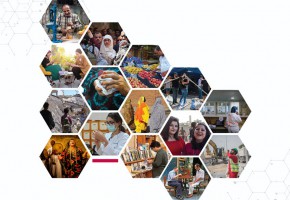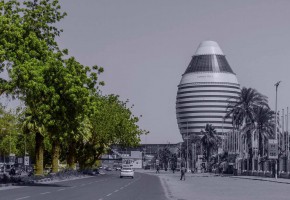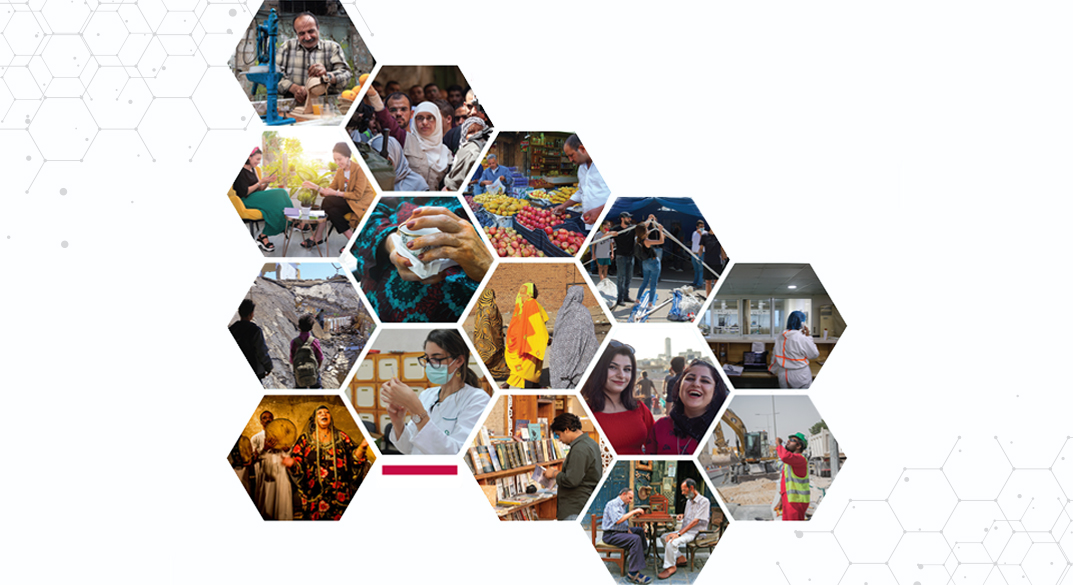
Introduction to the 6th Edition of the Arab Watch Report 2023 on Economic and Social Rights: Right to Health
Beirut, June 30th, 2023 - Click here to download as pdf.
Ziad Abdel Samad
Introduction
The world is witnessing dangerous transformations at various levels that expose a new world order that has yet to see the light and whose features have yet to be fully formed. The current crisis taking the world by storm has affected all countries, regions, and peoples without exception. It confirms the system's unsustainability, generating constant and destabilizing economic, financial, and climate crises and security and military tensions in most regions and continents. These crises, in turn, cause significant disparities in the distribution of benefits and wealth, with unprecedented rates of inequality recorded among Arab states. In fact, the "world's ten richest persons have more wealth than the poorest 3.1 billion people" (Oxfam 2022).[i] Inequality is widespread in all Arab states, where wealth is concentrated among the few and unevenly distributed. These inequalities have aggravated tensions and led to armed conflicts in several regions worldwide. Subsequently, spending on armament reached a new record of USD 2.24 trillion, or 2.2% of the world's gross domestic product (GDP) (SIPRI 2022)[ii], not to mention the number of refugees and the forcibly displaced, which has exceeded 110 million persons, after reaching 80 million in 2021, as shown in Figure 1 below (UNHCR 2022).[iii]
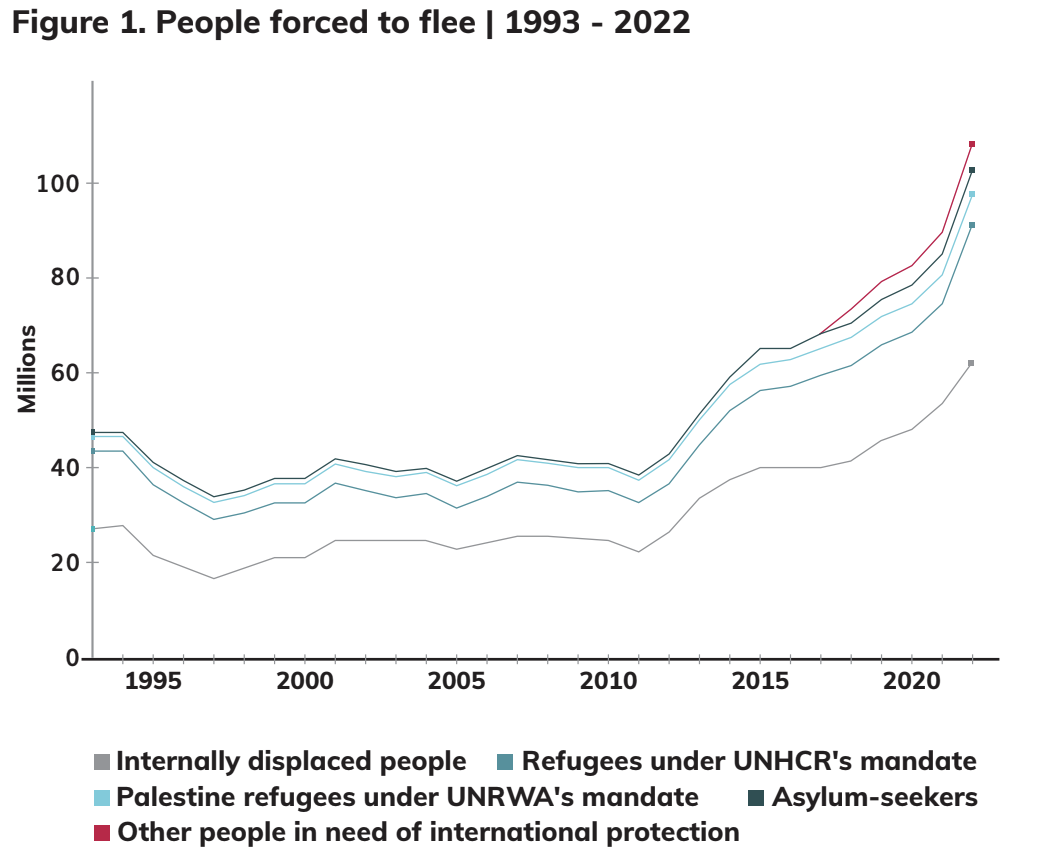
Arab Watch Report on Economic and Social Rights: Right to Health
The right to health ranked first among fundamental rights these past few years after COVID-19 caused severe economic and social repercussions worldwide. These repercussions affected the right to work and education. They highlighted the core deficiencies of health, education, and social protection systems and governments' inability to provide for their citizens basic services that are proper and fair. Hence, The Arab NGO Network for Development (ANND) took a significant interest in the right to health, adopting it as the topic for the 6th edition of its Arab Watch Report in an attempt to critically analyze health policies, or rather health systems, in both their institutional and structural dimensions on the one hand and their policy dimensions on the other.
The Region at the Heart of the Crises
Arab states suffer from numerous, multifaceted crises resulting from a combination of factors: the implementation of neoliberal policies and inadequate economic and social decisions for decades; and the near-total surrender to the recommendations of the international trade and financial institutions in return for loans and funding to reduce the deficit in budgets, public finances, and the trade balance. As a result, states have abandoned their social responsibilities and economic role, opting instead for privatization – of health services in particular – where health is treated as a commodity rather than a fundamental human right and one of the main components of the social contract. In addition, governments or lower-level decision-making authorities have adopted these policies and programs without any participation and accountability from the political, judicial, and popular levels. The numbers published by international organizations, including United Nations (UN) agencies, reveal unprecedented poverty and unemployment rates and significant inequality between the citizens of Arab states and within each state regarding wealth distribution and access to fundamental rights. In this context, the 2022 ESCWA report on inequality in the Arab region revealed that only 10% of the population owns 58% of the wealth in the Arab region. In contrast, the most disadvantaged 50% of society share around 8% of wealth (ESCWA 2022).[iv]
This challenging reality facing the region and its populations has led to popular protests that are still ongoing since the end of 2010 in most Arab states. The responses of the authorities and counter-revolution forces, as well as foreign interventions in the Arab Spring, have caused further disruptions and armed conflicts as a result of the ruling parties' refusal to give up power or any of their privileges, as well as their reluctance to implement necessary reforms that take into account the interests of the people and address the ever-deteriorating conditions. According to the World Bank, military spending in the Arab region reached around USD 2.03 trillion in the two decades between 1999 and 2018. This massive figure is equal to 5.6% of the GDP of Arab states during the same period. In 2022, military spending in the Middle East alone reached around USD 184 billion, a 3.2% increase compared to the previous year. Moreover, amid the security, economic, political, and climate turmoil, over 110 million people were forced to leave their homes, becoming displaced or refugees and asylum seekers, 30 million of whom are in the Arab region (UNHCR 2022).
Figure 2 below shows the volume of debts incurred by Arab states, constituting an economic burden with serious and long-term social repercussions. The internal and external public debt is now over 50% of GDP and even exceeds 100% of GDP in some cases.
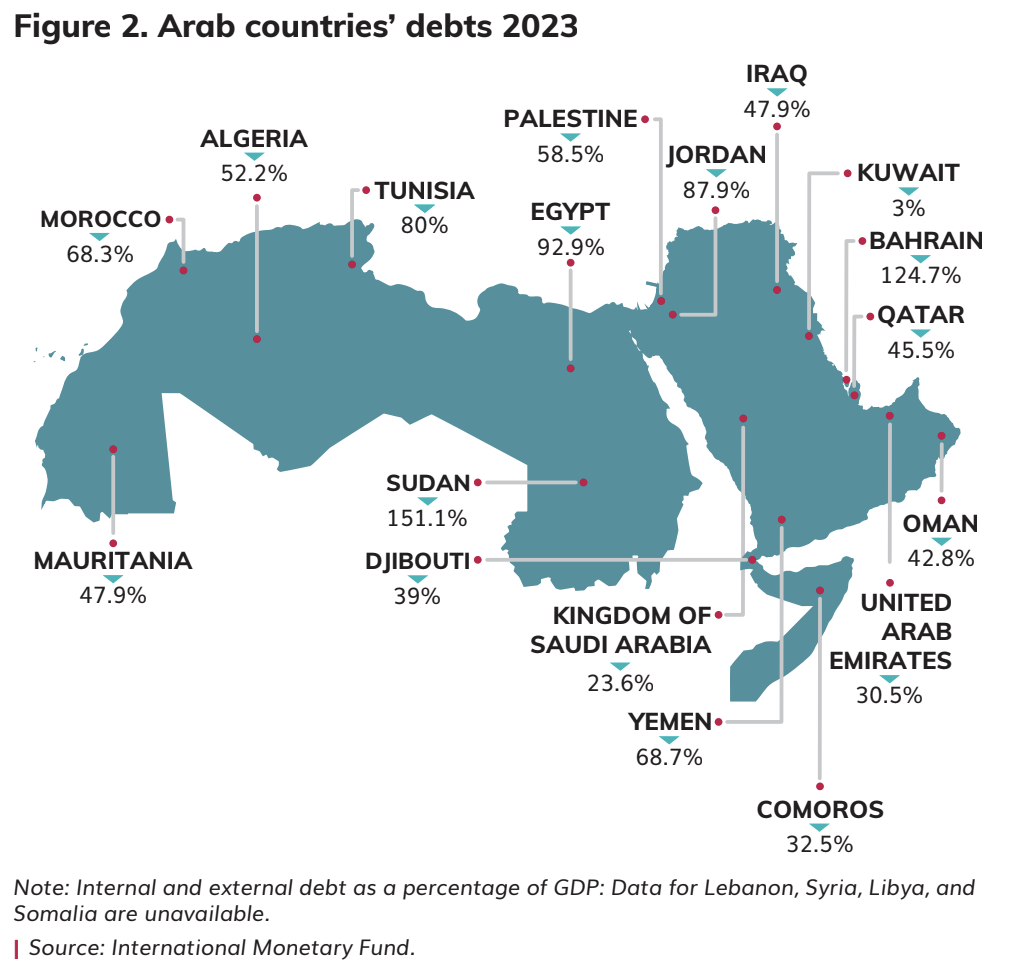
In an attempt to maintain the dominance of armed forces or the totalitarian, security, and populist regimes in positions of power, the region is currently witnessing a string of countercoups eroding the few humble victories achieved during the past decade in democracy and the rule of law.
This reality confirms two main issues:
- First: It is necessary to conduct a critical, bold, and thorough review at all levels concerning the responsibilities of the competent government authorities, including state institutions, security, military, and administrative bodies, and international, national, and local non-governmental actors, including the UN and financial, developmental, and trade institutions. Each of these parties holds a share of the responsibility. In this context, we must stress the need to give due consideration to the standards of "citizenship," namely the balance between rights and obligations, including the right to active political participation, the respect of freedoms, and the adoption of the principles of transparency, accountability, social justice, and equality among citizens.
- Second: Partnership is paramount to overcome these crises, and all the relevant parties should be involved in the development and political process through cooperation and complementary action. Here the growing role of civil society organizations (CSOs) is of utmost importance, especially in advocacy and the defense of human rights, which are universal, interlinked, and indivisible. Despite this growing and important role, it is not an alternative to the state's role and its political and social responsibilities toward society. The same applies to all other development partners. By partnership, we mean genuine collaboration rather than pro forma and unbalanced measures and relationships between the different parties or the ideology of public-private partnership, and we certainly do not mean any other type of commercial or profit-oriented partnership outside the scope of development and human rights.
Overview of the Health Situation in the Arab Region
The pandemic revealed many challenges that had been smoldering for decades, most notably violence, armed conflicts, and inequality; unemployment; weak social security networks; human rights violations; insufficient response from governments and their institutions; and the economic model which has failed to fulfill everyone's aspirations (ESCWA 2022).[v]
In most Arab states, health systems are hampered by structural issues, including the focus on treatment, amid the lack of universal social protection, primary health care, health awareness programs, and other preventive programs based on the concepts and principles of the World Health Organization (WHO). Moreover, there is a lack of commitment to rights, particularly the right to health and its requirements, in favor of vertical programmatic approaches. COVID-19 exposed the adverse outcomes of these trends and the ineffectiveness of current health systems' funding and material and human resources (Sawsan Abdulrahim).
ANND considers health a fundamental human right enshrined by the 1948 Universal Declaration of Human Rights and the 1978 Declaration of Alma-Ata (the International Conference on Primary Health Care). Similarly, the 1947 WHO Constitution stipulated that health is a fundamental right and includes a comprehensive approach to health. It also included key principles confirming the universality of this right, meaning it cannot be fragmented or divided. It is a right that humans should enjoy regardless of gender, age, religion, race, color, and affiliation. The state is responsible for providing this right to all citizens and ensuring its enjoyment. As such, the Declaration of Alma-Ata emphasizes equality among citizens and social justice, as well as the need to end wars and armed conflicts and direct essential spending toward building solid and consistent health systems capable of responding to the requirements needed to respect the right to health as a precondition to achieve security and social cohesion (Sawsan Abdulrahim).
The world order that emerged during and after the Cold War adopted neoliberalism as an economic model, marginalizing various economic and social rights, including the right to health, especially after the Bretton Woods institutions (International Monetary Fund and World Bank) started playing an important role in managing economic, financial, and development policies internationally. Financial and economic stability thus became the top priority. Structural Adjustment Programs (SAPs) were implemented, favoring austerity measures over social spending, leading to selectivity in applying the right to health while emphasizing certain simple aspects and neglecting other essential ones, contrary to international principles. This situation was aggravated by the World Bank, which became a primary funding and consultancy actor. The World Bank essentially promotes privatization, including health services, further reinforcing the role of the private sector and marginalizing that of the WHO and other international organizations (Mohamad Said Saadi).
Needless to say, the adoption of neoliberal policies over the past decades has undermined the International Covenant on Economic, Social, and Cultural Rights (1966) and led to a reduced commitment to fundamental rights, especially the rights to work, food, education, housing, and health. It is common knowledge now that all rights are interlinked and that the absence of one affects all others. What would the world come to if all these rights were absent?
As a result of these policies, the WHO noted that half of the Arab region's population is not covered by a primary health care system. Social spending in the region is estimated at 4.6% of GDP, compared to 12.9% internationally (Rana Jawad & Walaa Talaat). Jawad & Talaat add that 39% of the population in Arab states is covered, while this rate reaches 66% globally.
The Right to Health at the Core of International Agendas
The concept of the right to health has evolved in recent decades from the quantitative approach reflected in the Millennium Development Goals (MDGs) to the more universal qualitative approach of the Sustainable Development Goals (SDGs) defined in the 2030 Agenda. SDG 3 focused on the quality of life at the social, economic, and environmental levels, including governance and engagement. These changes were a direct result of the efforts made since 2000 to expand the concept of the right to health, which led to adopting the social determinants of health (SDOH) in 2003.
Interestingly, the right to health was no longer limited to measuring mortality rates of children and life expectancy at birth, as evidenced by Target 3.7, which includes sexual and reproductive care and family planning. Target 3.8 also addresses universal health coverage, including financial aspects, quality health care services, and access to medicines, treatments, vaccines, etc.
The notion of the right to health has also expanded to include ways to integrate it with the right to education and mental health and link it to certain forms of deprivation of freedom, accountability, the right to choose adequate health patterns, and so on.
This confirms the importance of viewing SDGs holistically, as stated in the SDG Summit Political Declaration, whereby achieving the goal related to health is contingent on achieving the goals related to education, decent work, food security, the environment, and equality, particularly gender equality.
The pandemic also highlighted the deficiencies of health systems, given the speed with which the virus spread despite the advanced scientific, technical, and early warning and prevention systems, as well as the risks resulting from the inaction of states who are responsible for fostering and protecting rights and who play a critical role in developing public policies. Furthermore, the pandemic emphasized establishing rights-based and fair social protection systems.
Partnership for the Right to Health
Partnership is one of the main pillars of development. It is based on equal opportunity among development partners. Actual partnership, however, is based on citizenship and the principles of rights and freedoms, particularly the right to expression, assembly, association, access to information, and participation. A critical review of development partners and their roles addresses the shared but varying responsibilities of each and the levels of transparency and accountability.
Therefore, to achieve equal partnership, an adequate environment should be provided to the different development partners, especially civil society, which lacks civic space due to the oppressive practices of political powers. Restricting public freedoms is at the top of these practices, particularly the freedom of expression, assembly, and association, access to financial resources, and the right to access information. Moreover, a critical review of civil society's role should be conducted as it aims to fill the gap resulting from the state's absence or poor contribution to providing basic rights to citizens. However, holding civil society responsible for the state's shortcomings and inability to respond to societal needs due to its fragmentation or ineffectiveness is an ill-conceived approach because it only considers the service aspect of civil society, neglecting other aspects such as advocacy, defense, and participation in developing, implementing, evaluating, and assessing the impact and effectiveness of public policies. The absence of the state means the absence of public health policies, which are closely related to other sectors such as environmental protection, quality education for all, housing, food, decent work, and social protection, among others. In addition, the absence of the state and the lack of accountability mechanisms diminish the commitment to rights and hamper their achievement.
Acknowledgements
This report is the result of the cooperation between ANND and the Faculty of Health Sciences at the American University of Beirut. It is a collaboration that brings together civil society, which defends and advocates for human rights in the field of public policies, especially at the economic and social levels, and the academic field, which provides knowledge and scientific analysis. This cooperation is beneficial to both parties: On the one hand, academic efforts are supported and find their way toward practical implementation, and on the other, civil society deepens its experiences, concepts, and tools, further improving its advocacy efforts.
This report is the outcome of more than a year's worth of efforts in research, deliberation, exchange of information and ideas, discussion, drafting, and review, by a team of specialists, professionals, and experts from the Arab region and some of the most prominent experts in the health field. The team was highly dedicated to its work and produced 12 national reports on the situation of the right to health and states' commitment to achieving the right to health, five thematic reports on the most notable issues and characteristics of our region pertinent to the right to health, such as neoliberal globalization (Mohamad Said Saadi), the nature of social protection systems (Rana Jawad & Walaa Talaat), political economy, governance mechanisms and health (Hani Serag), and the deficiencies in health systems uncovered by COVID-19 (Farah Al Shami), in addition to the regional report aiming to consolidate concepts, analyze the current reality in the region, and compare the situations in Arab states based on expert reports (Sawsan Abdulrahim).
The expert Maysa Baroud oversaw the content, coordinated the experts and researchers' work, allocated tasks, assigned roles, and followed up on the daily progress and production of the report. Our colleagues Adib Nehme, Zahra Bazzi, May Hammoud, Diam Abou Diab, Olga Jbeili, and Marie-José Saade from the ANND program teams contributed to reviewing and developing the content and providing observations and remarks. Finally, we would like to express our gratitude to the communications team that supported the production of this work, and we specifically thank Adham Al-Hassanieh, Diala Abdel Samad, and Jocelyne Abi Gebrayel and her team.
This report is the result of the cooperation between ANND and the Faculty of Health Sciences at the American University of Beirut, with the support of Brot für die Welt (Bread for the World), the Ford Foundation, Norwegian People's Aid, and Diakonia.
We would like to thank each and every person who contributed to the success of this publication.
Ziad Abdel Samad
Please click here to go back to the report details.
References:
[i] Oxfam. 2022. "Pandemic creates new billionaire every 30 hours — now a
million people could fall into extreme poverty at same rate in 2022."
Link.
[ii] SIPRI. 2022. "SIPRI Update April 2022: New Military
Expenditure Data, Stockholm Forum Registration, Impact of War in Ukraine
on Food Security, and More." Link.
[iii] UNHCR. 2022. "Global Trends Report." Link.
[iv] ESCWA. 2022. "Inequality in the Arab Region: A Ticking Time Bomb." Link.
[v] ESCWA, 2022. "Inequality in the Arab Region: A Ticking Time Bomb." Link.
Recent publications

ANND Newsletter January 2026 - From Davos to the UPR: Between Promises, and Accountability
Related publications
